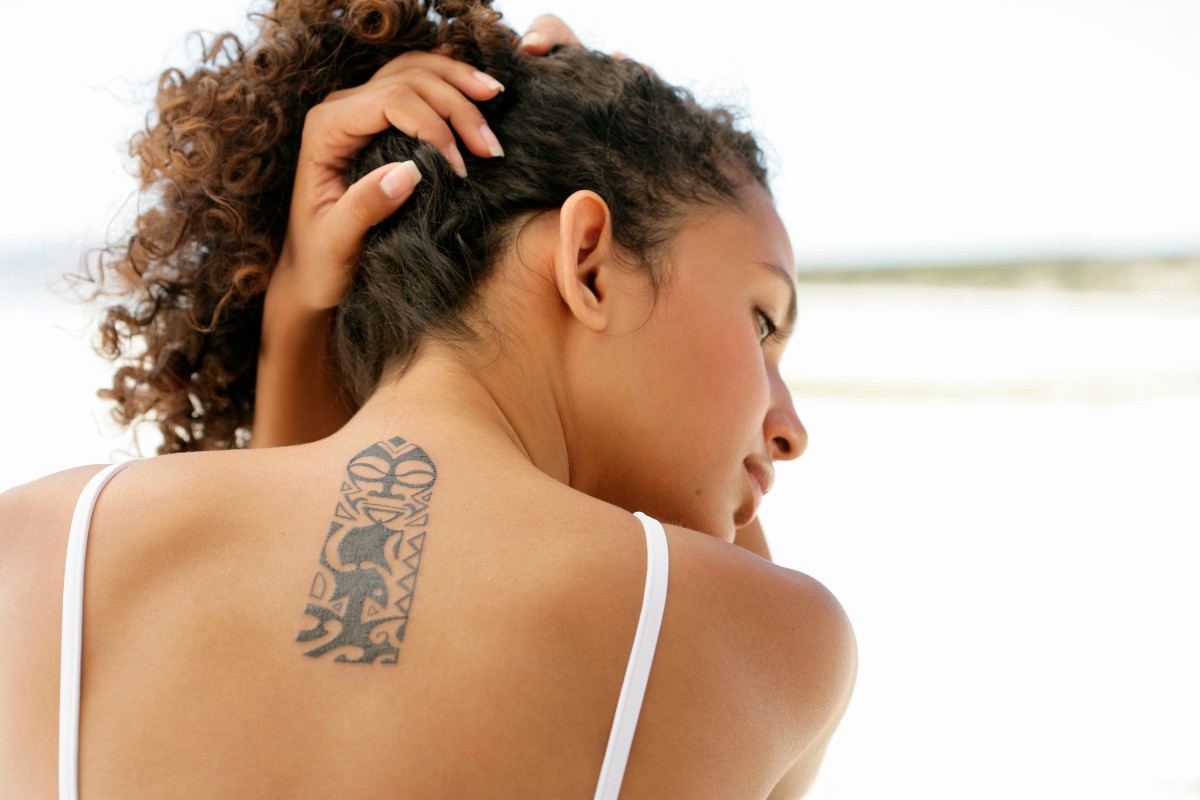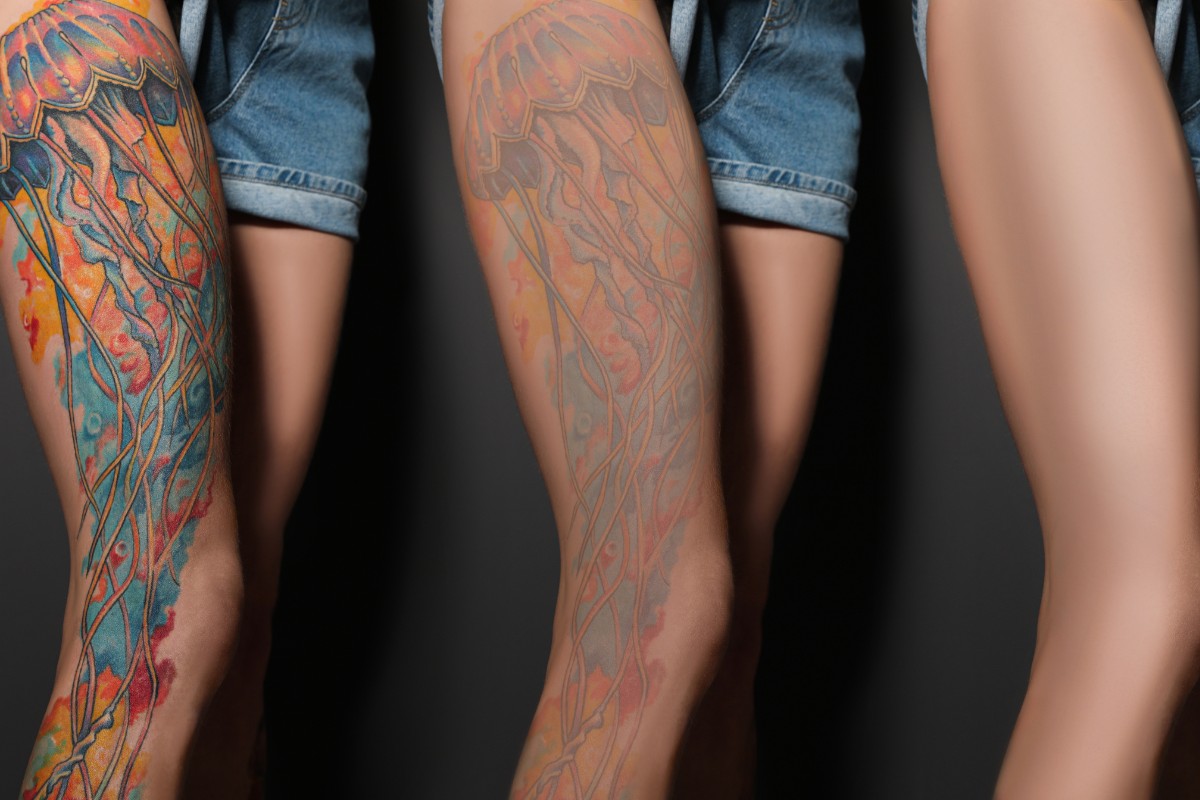There are many opportunities in life to get a tattoo.
For instance, a drunken night out, to mark a special occasion or the passing of a loved one, or to express a turning point in your life.
Whatever the reason, getting a tattoo can seem like a great idea at the time.
Unfortunately, as the following tattoo regret statistics show, it’s not always the best idea.
Modern tattoos use synthetic ink.
It’s injected just below the surface of your skin.
A tattoo gun uses a fine needle to puncture your skin 100 times per second.
The ink is put between 1.5 and 2 mm below the surface of the skin.
Close enough to the surface to be visible but deep enough to be underneath the skin cells which are constantly regenerating.
Your body will see it as a foreign agent and try to eliminate it.
However, the chemical component of the ink means it is very hard for your body to eject it.
In short, the tattoo will stay visible for years.
Of course, that doesn’t mean you will still want it in five, ten, or more years time…
It is worth noting that research is ongoing regarding what happens to the ink injected into your skin.
The latest studies show that some ink will move around your body via your bloodstream and the lymphatic system.
It’s a tiny quantity of ink but it can change the color of your lymph nodes and this could cause enlargement of the node and a little blood clotting.
What scientists don’t yet know is whether there are any health risks associated with this.
Post Contents
- 1 Key Statistics
- 2 Top Tattoo Regret Statistics
- 2.1 1. 12% Of People Regret Getting a Tattoo
- 2.2 2. 31% Of People With Tattoo Regret Are Considering Having it Removed
- 2.3 3. Regret Levels Lower As Tattoo Numbers Increase
- 2.4 4. 63% Of Regretted Tattoos Are Smaller Than The Palm Of Your Hand
- 2.5 5. 73% Of People With Tattoo Regret Made The Decision In A Matter Of Weeks
- 2.6 6. 35% Of Regretted Tattoos Were An Impulsive Decision
- 2.7 7. The Average Tattoo Removal Costs $463 Per Session
- 2.8 8. Globally, The Tattoo Industry Is Worth $1.89 Billion
- 2.9 9. 14% Of Adults Experienced Complications After Receiving A Tattoo
- 2.10 10. The Tattoo Removal Industry Is Worth $75 Million
- 2.11 11. 10% Of French People With Tattoo Regret Choose Laser Treatment
- 2.12 12. 30% Of Americans Have One Or More Tattoos
- 2.13 13. Only 8% Of Americans Regret Their Tattoo
- 2.14 14. 75% Of People Think Tattoos Will Negatively Affect Job Applications
- 3 Considerations When Opting For A Tattoo
- 4 Summing Up
Key Statistics
- 12% of people regret getting a tattoo
- 31% of people with tattoo regret are considering having it removed
- Regret levels lower as tattoo numbers increase
- 63% of regretted tattoos are smaller than the palm of your hand
- 73% of people with tattoo regret made the decision in a matter of weeks
- 35% of regretted tattoos were an impulsive decision
- The average tattoo removal costs $463 per session
- Globally, the tattoo industry is worth $1.89 billion
- 14% of adults experienced complications after receiving a tattoo
- The tattoo removal industry is worth $75 million
- 10% of French people with tattoo regret choose laser treatment
- 30% of Americans have one or more tattoos
- Only 8% of Americans regret their tattoo
- 75% of people think tattoos will negatively affect job applications
Top Tattoo Regret Statistics

1. 12% Of People Regret Getting a Tattoo
According to a 2023 report by Statista an impressive 88% of people with tattoos were happy with their choice and had no intention of getting rid of the tattoo.
That means, just 12% of people with tattoos regretted getting inked and were looking at ways to remove the tattoo.
Of course, many people simply have to put up with their judgment errors.
Laser removal can be expensive and covering it with another tattoo is not always a positive experience.
The survey covered adults over 18 and Statista asked 235 people.
Unfortunately, the survey didn’t delve into reasons for dissatisfaction or how much time passed after the tattoo was completed before regret set in.
(Statista)
2. 31% Of People With Tattoo Regret Are Considering Having it Removed
Of the 12% of people that don’t like their tattoo, 50% of people have taken action, or are ready to do so.
The survey found that 31% of people who regret their tattoos are seriously considering tattoo removal.
Interestingly, 19% of those who wished they hadn’t been tattooed have already had the tattoo removed.
It seems that specific types of tattoos are more likely to be regretted.
In fact, tribal tattoos are often a source of regret.
These are followed by heart tattoos and roses.
Even stars are often regretted, despite Rhianna making them popular.
Crosses, skulls, butterflies, flowers and dragons round off the top ten list of most commonly regretted tattoos.
In short, consider your design carefully before you commit to a tattoo.
(Gitnux/Statista)
3. Regret Levels Lower As Tattoo Numbers Increase
It appears that the likelihood of regretting a tattoo will drop the greater the number of tattoos you have.
This could be due to spending longer thinking about what to have inked on your body.
Equally, it could be an awareness that tattoos can be changed and covered over.
A recent Statista survey found that 26% of people with tattoos have just one tattoo.
In this category, 78% of people are likely to regret having a tattoo!
A further 23% of people have just two tattoos.
Impressively, the regret rate drops dramatically, perhaps because people have spent longer thinking about what tattoo to have.
Just 13% regret having a tattoo done.
Approximately 20% of people have three tattoos and only 6% of these people regret this decision.
Four tattoos are where you’ll find almost no regret.
10% of people have four tattoos and only 1% of them regret having a tattoo.
That’s an impressive level of satisfaction.
Finally, 21% of people with tattoos have five or more.
Just 2% of these people are likely to regret having a tattoo.
(Statista)
4. 63% Of Regretted Tattoos Are Smaller Than The Palm Of Your Hand
It’s slightly surprising to find that the majority of regretted tattoos are actually the smallest ones.
According to the latest figures, 63% of regretted tattoos are smaller than the palm of your hand.
Just 30% of no longer wanted tattoos are larger than the palm of your hand.
A further 4% dislike half-sleeve sized tattoos and just 2% have changed their mind about full-sleeve tattoos or larger.
It’s likely that smaller tattoos are more impulsive and large tattoos have been thought about for an extended period of time.
That effectively reduces the likelihood of regret.
It’s worth noting that the upper back is the most regretted spot, followed by the upper arms.
The hips, face, and even buttocks are also commonly regretted.
Fortunately, just 3% of tattoos are on the buttocks, 2% on the hips, and 3% on the face.
While the upper back isn’t the most popular spot for a tattoo, just 9% have this, the upper arms is one of the most popular spots, as well as one of the most regretted.
An impressive 42% of tattoos are on the upper arm.
(advdermatology)
5. 73% Of People With Tattoo Regret Made The Decision In A Matter Of Weeks
Looking at tattoo regret statistics is the perfect way to ensure you take your time choosing any tattoo.
This is illustrated by the 73% of people with tattoo regret who chose a tattoo within weeks of deciding to have one.
Put simply, the longer you think about a design the less likely it is you’ll regret it.
A recent survey showed that 28% of those with tattoo regret decided on a tattoo design within hours of deciding to have one.
A further 24% only thought about the design for a few days, and then regretted it.
In fact, 21% of those who regretted their tattoo thought about it for a few weeks.
The percentage of dissatisfaction drops quickly after this.
Only 14% of people who took a few months to choose a design regretted it.
Even better, those who took a year to select their design only regretted it in 6% of cases.
A further 6% spent years choosing it and still regretted it.
In short, if you want a tattoo, consider the design for 6-12 months to minimize the chances of you changing your mind.
(advdermatology)
6. 35% Of Regretted Tattoos Were An Impulsive Decision
Of all the respondents who regretted getting a tattoo, 35% had the tattoo done on impulse.
It sounded like a good idea so they did it, without much thought about its permanency.
A further 29% of those who regretted their tattoo had chosen ones with significant meaning, such as a loved one’s name, or special phrase.
Unfortunately, people change and this name or phrase may not be so important in the future.
Just 18% of those who regretted their tattoo had it done to look cool, and 6% were simply responding to peer pressure.
A further 6% thought the tattoo would look sexy, while 3% thought it would make them look tough and another 3% simply wanted to fit in with a specific group.
Interestingly, the most regretted style of tattoo is lettering, 16% of respondents had this style of tattoo.
(advdermatology)
7. The Average Tattoo Removal Costs $463 Per Session

Tattoos are not cheap.
A small tattoo can cost close to $100 and a large tattoo can cost anything from $150 upward.
It all depends on the size, complexity, and number of colors.
Even your pain tolerance level can affect the cost as you may need to return for additional sessions.
The cost of having a tattoo done is small when compared to the cost of removing it.
You should consider this before you commit to a tattoo.
On average, a session of laser treatment will cost $463 in the US.
This is the preferred removal method.
The size and location of the tattoo will affect how many sessions you are likely to need.
On average, it will take between four and seven sessions to eliminate a tattoo.
That means you could be spending over $2,000 getting a tattoo removed.
It will be several times more than what it cost to have the tattoo done in the first place!
There are other methods of removing tattoos but laser treatment is generally the most effective and least invasive.
(Statista)
8. Globally, The Tattoo Industry Is Worth $1.89 Billion
According to the latest Fortune Business Insights study the global tattoo market was worth an impressive $1.89 billion in 2022.
The market did take a nasty hit during the global pandemic.
People simply couldn’t get tattoos done.
Fortunately, it’s bounced back and there has been an impressive increase in interest and revenue.
Current predictions suggest the industry will be worth nearly $4 billion by 2030.
Of course, despite precautions, the higher the value of the industry and the greater the number of tattoos being issued, there will be an increase in those with tattoo regret.
That’s simply a percentage game.
It is worth noting that just over half the industry relates to temporary tattoos.
Surprisingly, Europe dominated the tattoo market during 2022, taking an estimated $0.63 billion, that’s roughly a third of the global market.
(Fortune Business Insights)
9. 14% Of Adults Experienced Complications After Receiving A Tattoo
A recent Gitnux survey encompassing 500 US adults found that as many as 14% of people had issues after the tattoo.
The most common issue is infection after the tattoo has been completed.
This can be due to tattoo equipment not being properly sterilized.
It can also be a result of failing to look after the tattoo properly.
It’s essential to follow the guidelines issued by your tattooist.
It’s also possible to experience pain.
This can be at the site of the tattoo or almost anywhere else in the body, depending on how the ink has traveled inside the body.
(Gitnux)
10. The Tattoo Removal Industry Is Worth $75 Million

The tattoo removal business can’t compete with the value of the tattoo industry.
That’s not surprising as many people with tattoos are happy with them.
In addition, the tattoo industry isn’t just made up of tattooists.
Piercings and other forms of body art are included in the industry figures.
According to the latest figures, the tattoo removal industry was worth $75 million in 2020.
The value of this industry has grown since then.
However, what is impressive is that the tattoo removal industry has been growing steadily for years.
It experienced a 7.7% growth between 2015 and 2020.
This growth rate is likely to continue into the foreseeable future.
Of course, if the tattoo removal industry is growing it would seem likely that more people are regretting their decision to have a tattoo.
This may not be the case as the tattoo industry is also growing.
The growth in the tattoo removal industry simply reflects the increased number of tattoos.
(IBIS World)
11. 10% Of French People With Tattoo Regret Choose Laser Treatment
As Europe is currently leading the tattoo market it seems appropriate to look at their removal processes.
According to the latest research by Le Point, of all the people in France who regret having a tattoo, 10% have already opted for laser surgery.
This approach attempts to remove the ink from the skin.
It is not always successful and some people may find a faint outline of the tattoo is still visible.
That’s something worth considering when deciding whether to have a tattoo done or not.
While 10% of people with tattoos getting laser removal may seem like a reminder that tattoos are not for everyone, it also attests to the quality of the French healthcare system.
(Le Point)
12. 30% Of Americans Have One Or More Tattoos
Tattoo regret levels are directly affected by the number of people with tattoos and the country you live in.
For example, current reports suggest that tattoo regret in 2023 is as low as 8% in the US.
That’s an improvement on the 12% in 2020.
Unfortunately, this doesn’t apply to all countries.
Tattoo regret is currently at 27% in Australia!
The percentage of people with tattoos in the US has been growing steadily for years.
This has been significantly helped by Millennials.
A recent survey found that 37% of Millennials have tattoos.
It has simply become more acceptable.
In 2012 an Ipsos poll found that 21% of Americans had at least one tattoo.
A new poll in 2019 found that his figure had increased to 30%.
That’s three in ten people having a tattoo.
(Ipsos Poll)
13. Only 8% Of Americans Regret Their Tattoo
The global average level of regret for tattoos currently sits at 12%, although this does vary dramatically depending on which country you are in.
As just mentioned, it’s as high as 27% in Australia.
In contrast, the US is enjoying high rates of satisfaction, just 8% of those interviewed admitted regretting their tattoos.
This is a considerable improvement in the US on 2016.
At that time, Skinco performed a survey on over 1,000 people and found tattoo regret was sitting at 14%.
While this is a little subjective depending on who responded, it does indicate that tattoo regret in the US is lower than the global average.
Very few people with tattoos regret their decision.
(McCrindle)
14. 75% Of People Think Tattoos Will Negatively Affect Job Applications

Tattoos have become an acceptable form of body art in the modern world.
However, that doesn’t mean all the stereotypical images have disappeared.
One of the biggest issues the tattoo industry faces is the stereotypical negative reaction to anyone with a tattoo.
Unfortunately, even in a modern digital world, most people see tattoos as a negative business influence.
A recent survey by salary.com found that, of over 2700 people, 75% of them felt that a tattoo gave the wrong impression at a job interview.
Interestingly, 39% of those surveyed also stated that tattooed employees reflect badly on the business.
This lowers the likelihood of a tattooed candidate being offered a job.
It’s worth noting that just 9% of American government employees, and 8% of the US Information Technology industry are tattooed workers.
In short, the situation may have improved but stereotypes are still an issue.
(Salary.com)
Considerations When Opting For A Tattoo
One thing that the above statistics make clear is that a lot of people regret having a tattoo and are left either to put up with it; cover it, or pay to have it removed.
That’s why, before you commit to a tattoo you should consider the following.
Plan, Plan, Ad Plan Some More
The statistics show the longer you think about a tattoo the less likely it is you’ll regret it.
Only 5% of people who spent a year or longer thinking about a tattoo regretted the decision.
It’s advisable to spend between 6-12 months thinking about it, this will dramatically reduce the likelihood of you regretting it.
Check Location
It seems clear that certain areas of the body are more likely to create tattoo regret.
The areas most regretted are the upper back, upper arms, buttocks, face, and hips.
If you want to avoid regretting your tattoo it’s advisable not to put it in one of those locations.
Consider Size
Size is often an important consideration and this is true for tattoos.
Take your time choosing the right tattoo and find one you like that is bigger than the palm of your hand.
It may seem counter-intuitive, but a larger tattoo takes more planning and is less likely to be regretted.
In short, the longer you think about it and the larger you get it, the less likely it is you’ll regret it.
Keep Your Emotions Out Of The Decision
Emotions may seem appropriate to help you choose a design that has a special meaning for you.
However, you should proceed with caution.
If you’re in a heightened emotional state you are more likely to have a tattoo done and then regret it.
It’s good to include emotion in the decision but only if you take plenty of time to consider all the options.
Summing Up
One thing that the above tattoo regret statistics clearly show is that regret is surprisingly common.
However, there are several ways to mitigate the likelihood of regret and save yourself the cost of tattoo removal.
The secret is to take your time, spend as long as possible thinking about your tattoo design and location, and then commit.
Avoid the obvious regret locations and anything that could become irrelevant in the future, such as names.
Just remember, it is possible to get a tattoo removed, so don’t procrastinate for too long!






























